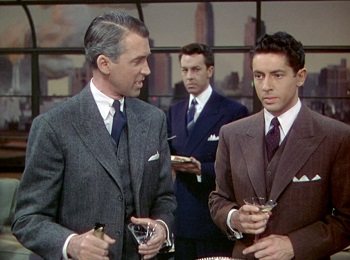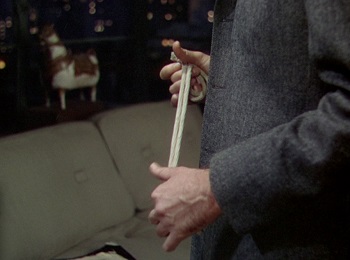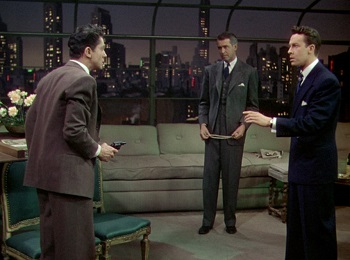"...Tonight you've made me ashamed at every concept I ever had of superior and inferior beings. But I thank you for that shame, because now I know that we are each of us a separate human being..."
 Considering the themes and philosophy within Rope, I stand by this being one of, if not Hitchcock's most underrated film. It seems to only receive praise and admiration by exclusively Hitchcock's fan base and is, for the most part, unnoticed by everyone outside of those fans. It also might be his most fascinating and most dialogue-driven film.
Considering the themes and philosophy within Rope, I stand by this being one of, if not Hitchcock's most underrated film. It seems to only receive praise and admiration by exclusively Hitchcock's fan base and is, for the most part, unnoticed by everyone outside of those fans. It also might be his most fascinating and most dialogue-driven film.
Rope's source of praise mostly comes from the ground breaking direction and like most Hitchcock films, is considered to be a technical achievement in terms of presentation and style. He did an amazing job in attempting to convey a film directed within a single take. Considering the setback of not being able to keep a camera running on its own for that long, Hitchcock devised a way to beat that setback by doing what he's perhaps best known for: camera trickery.
There are a number of reasons behind this. It's obvious that this is one of his most auteur-driven films because of his determination to show the world a film unlike anything they had seen before and that was indeed a success. Supposedly Hitchcock did this because he wanted to cross mediums in making a film presented exactly like seeing a play, which makes sense since Rope is based on the play of the same name. But the unique direction has been discussed and praised enough. I want to get into the rest of it. The acting is incredible in this film, mostly because of the leads: John Dall, Farley Granger and James Stewart, the latter of which is always hard to disappoint. Granger does a superb job in depicting a man slowly losing his mind within 80 minutes. He is convincing in his paranoia and increasingly frantic state. The real standout is Dall as Brandon Shaw, a charming sociopath who has absolutely no regard for the lives of others. I would put him next to Bruno Anthony as one of Hitchcock's most disturbing and creepiest villains. Whenever a sinister thought enters his head, you can see it clearly through his vivid and unsettling facial expressions. He makes it abundantly clear by the film's opening till the end that he is getting off on everything that happens. He subtly taunts and messes with every character's head, mostly his partner in crime, Phillip (Granger).
He makes it abundantly clear by the film's opening till the end that he is getting off on everything that happens. He subtly taunts and messes with every character's head, mostly his partner in crime, Phillip (Granger).
The relationship between Phillip and Brandon seems simple enough at first, but as the film escalates in tension, we see there is much more complexity to what goes on between these two men. Hitchcock is no stranger to sexual themes and innuendo and such themes are possibly at their most controversial here, right down to the sexual nature in strangulation. The relationship between the two murderers seems to imply a homosexual tone built upon dependency. Brandon is clearly disliked by the people in his life which only leaves the impressionable, and seemingly naive, Phillip to his advantage. Phillip, in turn, seems completely devoted to and dependent on his partner. It's never quite clear what makes him so attached to Brandon. While Brandon seems to stand more on his own as an individual, his interactions with Phillip display a psychological manipulation of a lesser mind but, unlike his behavior throughout the rest of Rope, Brandon also seems to need Phillip in an almost symbiotic way because it gives him the strength and overconfidence which he displays throughout. It's that strength and overconfidence that masks how much of a weak and pathetic man he is underneath his bravado. The hold he has over Phillip seems almost symbolic in Brandon being the brain to Phillip's body, as Phillip is the one who commits the murder and right from the beginning is obviously consumed with regret and resentment toward Brandon's manipulation.
Jimmy Stewart as Rupert reminds me loosely of the young Charlie in Shadow of a Doubt. Both become unconventional detectives through their constant uncovering of the truth that starts from innocent curiosity to willful determination. As an actor, Stewart has a terrific charisma about him. He really is one of the greatest actors of Hollywood's golden age and I always seem to buy into how convincing he can be in his performance. The concept of murder and what justifies such a heinous act is vastly explored within Rope and I believe this to be Hitchcock's most philosophical film because of this theme. The amazing dialogue explores what makes an ideal justified and how said ideal, while intended to stand for something justifiable, can still be perverted through the translation of an individual. Rupert displays pride in his belief that murder is justifiable in terms of superiority and inferiority. He believes if people don't make the best out of their lives, there really is no necessity in their existence, but by the film's end he has this ideal brought before him and crushed in the most destructible way possible, and while it could be debated that Rupert's character is responsible for the murder that spurs the story, what's actually happening is his, and the viewer's realization that any belief or ideal can be twisted and deformed when introduced to a sick and evil mind. The message we are left with is that an ideal transcends good and evil when taught to an individual, that said ideal can inspire but not dictate, that the ideal itself is still taught by an individual and everyone, whether they be good or evil, will take such an ideal and twist it to their own logic and intent.
The concept of murder and what justifies such a heinous act is vastly explored within Rope and I believe this to be Hitchcock's most philosophical film because of this theme. The amazing dialogue explores what makes an ideal justified and how said ideal, while intended to stand for something justifiable, can still be perverted through the translation of an individual. Rupert displays pride in his belief that murder is justifiable in terms of superiority and inferiority. He believes if people don't make the best out of their lives, there really is no necessity in their existence, but by the film's end he has this ideal brought before him and crushed in the most destructible way possible, and while it could be debated that Rupert's character is responsible for the murder that spurs the story, what's actually happening is his, and the viewer's realization that any belief or ideal can be twisted and deformed when introduced to a sick and evil mind. The message we are left with is that an ideal transcends good and evil when taught to an individual, that said ideal can inspire but not dictate, that the ideal itself is still taught by an individual and everyone, whether they be good or evil, will take such an ideal and twist it to their own logic and intent.
Rope may not be as suspenseful and as powerhouse as Hitchcock's most regarded films, but it is arguably his most important film because of the philosophy at the center of its story. It's Hitchcock, so of course it's going to entertain, but it's a film to be experienced more for its enlightenment in the dissection of such a controversial topic.
Please feel free to discuss "Rope" here, in our forums!

